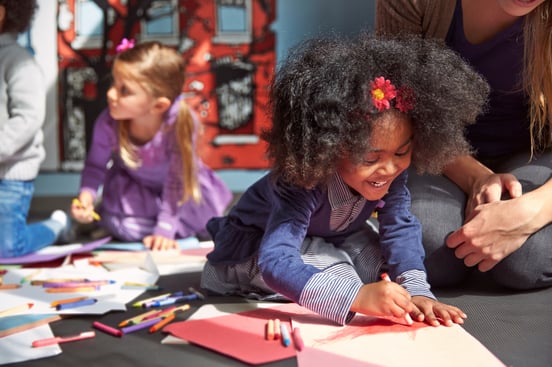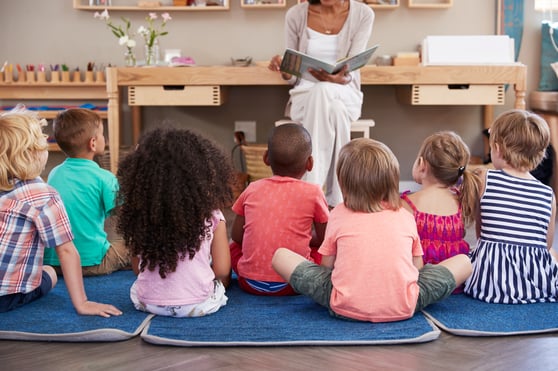
Why is STEM So Important in Early Childhood Education?
Early childhood is perhaps the most critical moment in a student's education life.
This is the stage where a journey of...
ALI Staff | Published February 06, 2024
Language and literacy form the bedrock of early learning, crucial for building the skills that children carry throughout their lives.
For preschoolers, whose minds are like sponges eagerly soaking up new information, this is the perfect time to nurture their understanding of language and their excitement for reading.
This phase of their development is a golden opportunity to deeply enrich their learning journey with engaging language and literacy activities.
In this article, you will learn:
Diving into the realm of language and literacy opens a door to a world filled with discovery and educational adventures for both preschoolers and those guiding them.

The early years of a child's life are critical for developing key literacy and language skills. These skills are more than just the ability to read and write; they are the building blocks for communication, critical thinking, and understanding the world.
In preschoolers, engaging in literacy activities is not just about learning the alphabet or reading words—it's about igniting a love for storytelling, expanding their vocabulary, and laying the groundwork for effective communication.
Preschool learning activities play a pivotal role in this developmental stage. They provide young minds with the opportunity to explore language in its many forms, whether through songs, stories, or interactive games.
These experiences are essential for developing a strong foundation in language and literacy, which will support their academic journey and personal growth in the years to come.
Engaging in literacy activities during these formative years helps preschoolers develop a range of skills:
By integrating literacy activities into their daily lives, preschoolers are set on a path of lifelong learning and curiosity.
Before diving into strategies and activities, it's crucial to understand what literacy encompasses in a preschool setting. Literacy in preschool goes beyond just learning to read and write. It's a comprehensive concept that includes several key components:
In preschool, these elements are nurtured through a blend of structured activities and play-based learning.
The goal is to create a fun, engaging, and supportive environment where children can explore and develop these foundational skills, setting them up for future academic success and a lifelong love of reading, writing, and learning.
Every preschool teacher understands the power of creative and engaging activities in nurturing literacy skills in young learners.
To spark your imagination and enrich your teaching toolkit, we've compiled a selection of tried-and-true activities.
Gathered together in a cozy corner, preschoolers delight in the world of books during read-aloud time in a small group.
This special time, filled with both enchanting stories and fascinating nonfiction, is more than just fun; it's a foundation for building robust literacy skills.
Each fiction and informational book read and reread helps children understand words, recognize sounds, and start to anticipate what comes next.
Whether exploring imaginary worlds or learning real-world facts, it's a joy to see their language skills flourish with every book shared.
This interactive and diverse reading experience is crucial in nurturing young readers and sparking a lifelong passion for all kinds of books.
Children use puppets to retell their favorite stories. This can be done with simple hand-made puppets representing the book's characters. It's a fun way for children to practice storytelling and recall as they bring the narrative to life through puppetry.
Invite children to draw their own ending to a favorite story. This encourages creative thinking and artistic expression. They can share their drawings with the class and explain how their ending differs from the original, promoting imagination and narrative skills.
Using printed pictures from the story, children can arrange them in the order they appear in the book. This simple activity helps them understand the sequence of events and reinforces story structure in an engaging way.
After reading a nonfiction book, engage preschoolers in activities that directly respond to the content. For instance, if the book is about butterflies, they could sequence the stages of a butterfly's life cycle. If it's about animals, they could match animals to their habitats. The specific activity will depend on the book's topic, allowing for a variety of interactive and educational experiences.
Listening comprehension is essential for preschoolers' literacy development. It involves understanding spoken words and stories, which is crucial for learning to read and communicate effectively.
Activities focused on listening skills help children follow instructions, grasp storylines, and develop attention to detail.
Enhancing these skills at an early age sets the stage for successful classroom learning and effective communication.
A game where children listen to descriptions and match them to pictures. This activity develops listening comprehension and attention to detail, which are crucial for understanding stories and instructions.
Children follow multi-step oral directions in a game format. This improves their listening skills and ability to process and follow instructions, which is important for academic success.
Sensory activities play a crucial role in developing literacy skills in preschoolers.
Engaging multiple senses, these activities enhance letter recognition, fine motor skills, and understanding of language concepts. They provide a tactile and interactive experience, making learning more memorable and enjoyable.
Such activities are especially effective in early childhood, laying a strong foundation for reading and writing in a fun, engaging manner.
In this activity, fill trays with sand or flour, allowing preschoolers to practice writing letters and simple words with their fingers. This sensory experience not only teaches letter recognition but also helps in fine motor skill development, which is crucial for early writing.
Use playdough to strengthen hand muscles and learn letter shapes. Children can roll, flatten, and shape playdough to form letters of the alphabet. Use playdough mats or other aids to help students form letters correctly. This tactile activity helps in muscle development and provides a fun, hands-on way to practice letter formation.
Phonemic awareness is a key component in early literacy development and is essential for preschoolers.
It involves the ability to hear, identify, and manipulate individual sounds in spoken words.
Activities focused on phonemic awareness lay the groundwork for reading and spelling skills as they teach children to recognize and work with sounds in language.
Engaging in these activities helps build a strong foundation for future literacy success, making learning to read and write a smoother process.
In this group activity, children are encouraged to think of and recognize rhyming words, enhancing their ability to hear and manipulate sounds in spoken language, a key skill for developing reading abilities.
Children can match objects or pictures with the same beginning sounds. This activity strengthens their understanding of phonemes, the smallest units of sound, which is crucial for reading and spelling.
In this version of bingo, children listen for and identify different sounds instead of numbers, which sharpens their phonemic awareness and listening skills, both essential for early reading development.
Children group words represented by pictures into families (e.g., cat, hat, bat). This helps them recognize common spelling patterns and sound structures in words, aiding in future decoding skills.
Alphabet knowledge is fundamental in the journey of literacy for preschoolers.
It encompasses recognizing letter shapes, understanding their sounds, and grasping their place in the alphabet sequence.
Activities centered around alphabet knowledge not only familiarize children with letters but also build the basis for phonics, reading, and writing.
This foundational skill is crucial as it sets the stage for children to decode words and begin reading, paving the way for academic success.
Children search for objects that start with each letter of the alphabet. This activity promotes letter recognition and understanding the alphabetic principle – foundational for reading and writing.
Each day focuses on a different letter, involving activities that highlight its shape, sound, and usage. This reinforces alphabet knowledge, which is crucial for early literacy.
Sorting objects or pictures by their beginning letters helps children understand alphabetical order and letter recognition, key components of early literacy skills.
Children create art based on different letters. This tactile activity reinforces letter recognition through creative expression, making learning the alphabet engaging and memorable.
Tracing letters in various mediums like sand or with finger paints. This activity develops fine motor skills and letter formation knowledge, which is essential for writing.
Building a strong vocabulary is a cornerstone of literacy for young learners. It's about more than just learning new words; it's understanding their meanings and contexts.
Engaging in vocabulary-building activities helps preschoolers express themselves better and comprehend what they read and hear.
This development is crucial for reading comprehension and overall language proficiency, forming a foundation for lifelong learning and communication.
Introducing a new word each day, used in sentences and conversations, expands children's vocabulary and understanding of language use, a critical aspect of literacy development.
By labeling objects in the classroom, children associate words with their corresponding objects, enhancing word recognition and environmental print awareness, which is foundational for reading.
Children describe an object for others to guess, using picture choices for reference. This activity builds vocabulary and descriptive language skills, which are important for expressive language development.
For educators in preschool settings, seamlessly blending literacy into the daily routine is key to fostering an environment rich in language development.
Here are some general tips that can help make literacy a natural and integral part of every school day:
By following these tips, educators can create a dynamic and engaging learning environment where literacy is interwoven throughout the day.
This approach not only supports the development of reading and writing skills but also nurtures a lifelong love for learning and exploration in young children.
Strengthening literacy skills in preschoolers is a critical step in their educational journey.
It's essential for future school readiness, laying the groundwork for academic success and effective communication.
These activities, carefully crafted for both enjoyment and learning, are invaluable tools for teachers to nurture young minds, preparing them for the exciting challenges of future schooling.

Early childhood is perhaps the most critical moment in a student's education life.
This is the stage where a journey of...

Are students in your science classrooms merely completing activity after activity and moving on? Or do they have a...

STEM brings together science, technology, engineering, and math in a connected way.